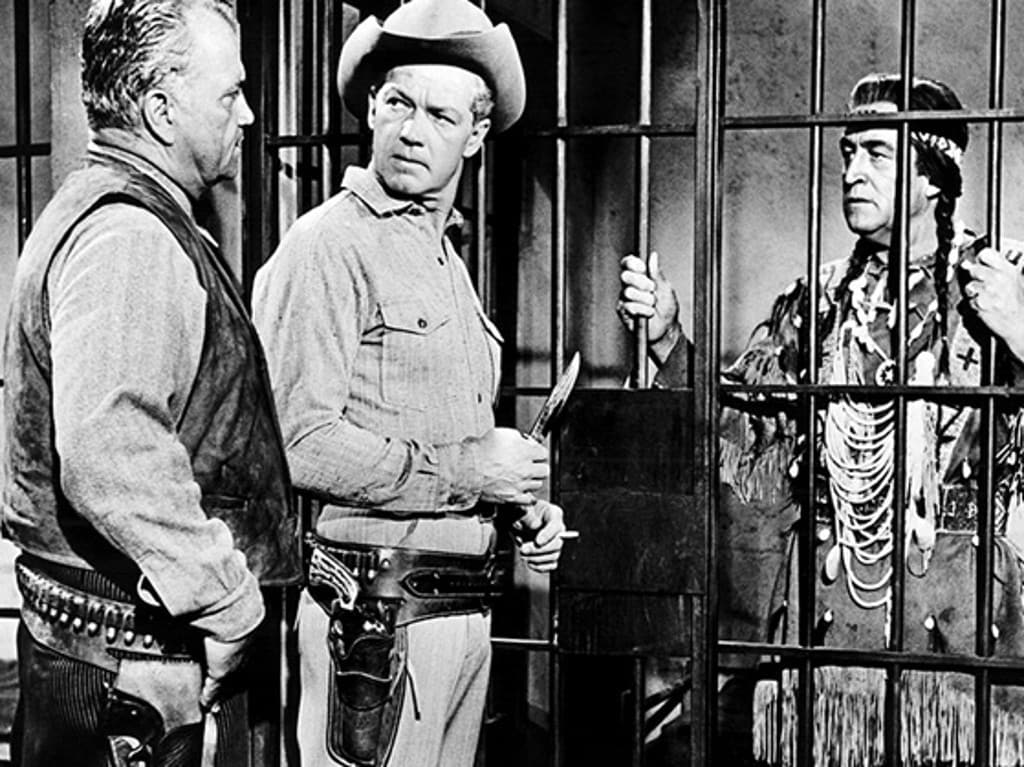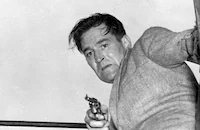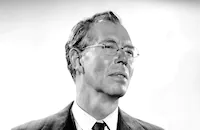Oklahoma Territory

Brief Synopsis
Cast & Crew
Edward L. Cahn
Bill Williams
Gloria Talbott
Ted De Corsia
Grant Richards
Walter Sande
Film Details
Technical Specs

Synopsis
In 1872, the Oklahoma territory is simmering with tensions between the Indians and the white people. While out riding one day, Temple Houston, the district attorney of Fort Smith and the son of Sam Houston, sees a band of white riders attack a group of Indians. When Temple intervenes, one of the white assailants claims that he and his posse have been deputized to arrest Buffalo Horn, the chief of the Cherokees, for the murder of Indian Commissioner Allen Barbee. Although Temple is Buffalo Horn's friend, he has no choice but to uphold the law and arrest the chief. In the town of Fort Smith, meanwhile, Bigelow, an agent for the railroad, instructs Larkin, the gunfighter he hired to murder Barbee and frame Buffalo Horn, to arrange for the chief's death. Upon delivering Buffalo Horn to Marshal Pete Rosslyn's jail, Temple is beseeched by Ruth Red Hawk, the chief's daughter and Temple's sweetheart, to release her father. When Temple refuses, Ruth warns of an impending war with the Indians. Soon after, a lynch mob led by Larkin storms the jail, but Rosslyn and Temple disperse the crowd with gunfire. A review of the evidence against Buffalo Horn reveals an airtight case: Barbee was killed with the chief's knife and an eyewitness, Tom Badger, has sworn that he saw Buffalo Horn stab Barbee. Although he admits to having argued with Barbee over the commissioner's plan to disperse jointly held tribal lands to individual Indians, Buffalo Horn swears that he never harmed Barbee and that he spent the night of the murder with a family of white settlers named Lindstrom. When Rosslyn counters that the settlers have denied Buffalo Horn's alibi, Temple rides to Barbee's house to conduct his own investigation. There, he finds Barbee's journal and discovers that the commissioner had made plans to travel to Washington, D.C. to present his proposal, thus strengthening Buffalo Horn's motive for murder. Next, Temple rides to the Cherokee reservation to confer with Sparrow Hawk, Buffalo Horn's hot-tempered son. Sparrow Hawk, spoiling for war, orders Temple beaten and dumped on the marshal's doorstep. Although Buffalo Horn continues to protest his innocence, Temple refuses to believe his old friend. As the date of the trial approaches, George Blackwell, a political power in the territory, comes to town, summoned by Bigelow. Hoping to influence Temple, Bigelow proposes that Blackwell offer the district attorney the position of governor if he wins a conviction, but Temple postpones his decision until after the trial. At the trial, Temple exhibits the overwhelming evidence against Buffalo Horn. When Ward Harlan, the editor of the local paper, overhears Blackwell's plan for using a guilty verdict to propel Temple to the governor's office, he pens an editorial against political corruption. After Buffalo Horn is found guilty and sentenced to hang, Ruth breaks off her relationship with Temple, gallops out of town and dispatches three braves to search for the Lindstrom family. Harlan, meanwhile, informs Temple that under an 1867 treaty, the Cherokees must forfeit their lands to the railroad if they go to war. Sensing a link between Bigelow and the chain of pat evidence against Buffalo Horn, Temple decides to reopen his investigation. When Ruth reports that the Lindstrom family has been found and will testify in her father's defense, Temple tricks Badger, the eyewitness, into revealing that his eyesight is failing. Before Badger can be deposed, however, Larkin shoots him. Upon discovering that Baily, the man who refuted Buffalo Horn's testimony about spending the night with the Lindstroms, had been bribed by Badger, Temple decides to reopen the trial. Bigelow, however, learns that the Lindstroms have been located and arranges for Buffalo Horn's execution to be moved up before the Lindstroms can reach town. To save his friend's life, Temple breaks him out of jail. At the new hearing, Temple announces that he is now acting as Buffalo Horn's attorney and calls the Lindstroms to the stand. After the Lindstroms confirm the chief's alibi, Temple is about to denounce Larkin and Bigelow when Larkin stands and fires at Temple, who ducks and shoots Larkin. After Rosslyn arrests Bigelow, Buffalo Horn is exonerated of all charges, and Temple and Ruth reconcile.

Director
Edward L. Cahn
Cast

Bill Williams
Gloria Talbott

Ted De Corsia
Grant Richards

Walter Sande
X Brands

Walter Baldwin
Grandon Rhodes
John Cliff
Crew
Henry Adams
Felix Barlow
Einar Bourman
Robert Bradfield
Edna Bullock
Al Cline
Ted De Corsia
Pat Dinga
Bert Eason
John Franco
Buzz Gibson
Bill Glasgow
Albert Glasser
Allan Gordon
Herbert S. Greene
Orville H. Hampton
Gene Hibbs
John Kean
Robert E. Kent
Madison Lacy
Sabine Manela
Michael Minth
Betty Pagel
Victor Petrotta
Victor Petrotta
Jim Punter
Tiger Shapiro
Edward Small
Joseph Small
Frances Sperry
Walter Strenge
Grant Whytock

Film Details
Technical Specs

Quotes
Trivia
Notes
According to a July 1959 Hollywood Reporter news item, Adele Mara was originally to play the role of "Ruth Red Hawk," but had to withdraw due to a scheduling conflict. Although Hollywood Reporter news items place Tom Brown Henry, Hal Torey, Charles Stevens, Boyd Red Morgan, George Barrows, Kenne Duncan, Jack Kenney, Eddie Little Sky, Bob Woodward and Paul Bradley in the cast, their appearance in the released film has not been confirmed.













